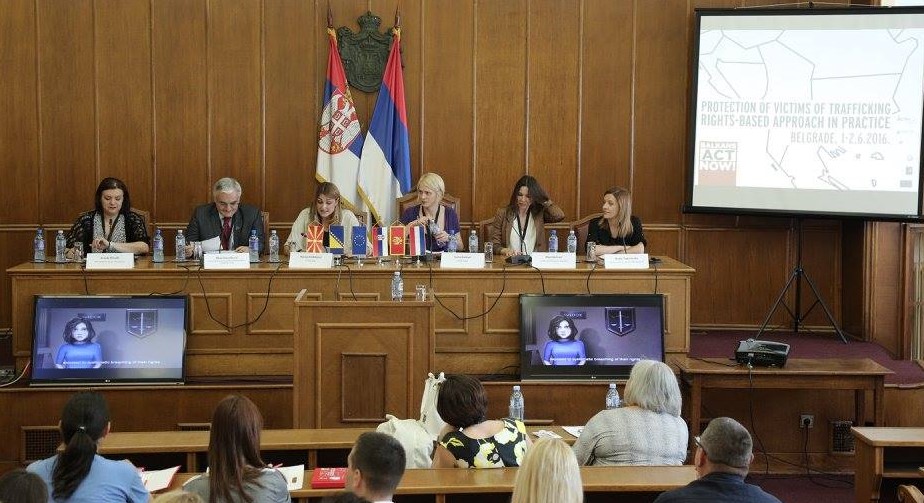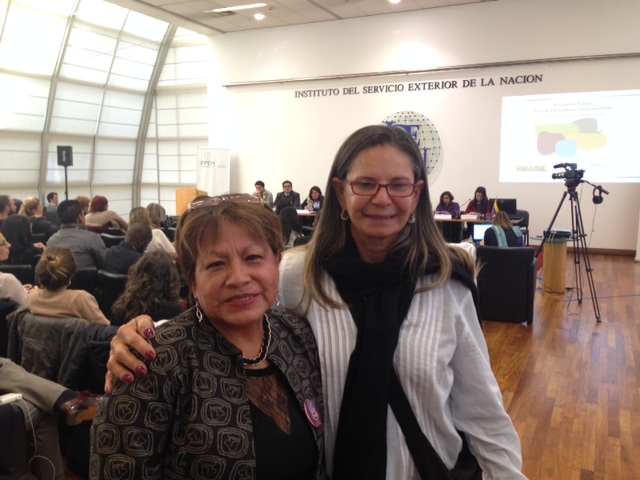E-Bulletin July 2016 - News from our Member Organisations
Trafficking Routes in the Peruvian Amazon
GAATW member Capital Humano Social Alternativo, Peru, conducted a research into the modalities and routes used by human traffickers in the Peruvian Amazon to recruit their victims and lead them to the places where they are subjected to diverse forms of exploitation.
The objective of the research was to describe and analyse these routes, defining them not only as a number of roads and transport routes that traffickers use to take their victims from point A to B, but considering also the steps by which an individual becomes a potential victim. The study covers the conditions of vulnerability in their place of origin, and how gradually they are stripped of their rights to end up in situations of exploitation. It includes the description of the actors, modus operandi and social characteristics, but also the policies directly or indirectly involved in the recruitment, transfer and exploitation of the victims. The ethnographic method used in this study is a purely qualitative approach that has taken into account various ethnic and cultural variables to analyse the problem of human trafficking in the Amazon.
The main findings of the study show that indebted people are targeted by criminals who find ways to exploit their labour. There is also lack of knowledge of the crime of human trafficking among the population that is at risk of exploitation, and lack of awareness on children’s and adolescents’ rights. There is significant impunity in the informal transit system throughout the entire route, where the Police or the Ministry of Transportation exercise almost no control. As for the prosecution and punishment, there is a lack of awareness and knowledge among the authorities, no coordination between them, and no specialised offices to fight against trafficking.
Regional Conference ‘Protection of Victims of Trafficking – Rights-based Approach in Practice’
 On 1 and 2 June ASTRA – Anti Trafficking Action organised a regional conference ‘Protection of Victims of Trafficking – Rights-based Approach in Practice’, in partnership with International Forum of Solidarity EMMAUS, Bosnia and Herzegovina, Women’s Rights Center, Montenegro, Open Gate/La Strada, Macedonia and La Strada International in Belgrade, Serbia.
On 1 and 2 June ASTRA – Anti Trafficking Action organised a regional conference ‘Protection of Victims of Trafficking – Rights-based Approach in Practice’, in partnership with International Forum of Solidarity EMMAUS, Bosnia and Herzegovina, Women’s Rights Center, Montenegro, Open Gate/La Strada, Macedonia and La Strada International in Belgrade, Serbia.
The conference aimed to present the current situation with access to justice and compensation for trafficked persons in the four Western Balkans countries and the results of the monitoring of national anti-trafficking policies and practices conducted by the partners.
One of the conclusions was that despite certain progress made and the developed systems and indicators, the countries are witnessing a decreasing number of identified victims, frequent violations of the reflection period, inadequate housing and lack of sustainable reintegration programmes. Civil society organisations are not sufficiently involved in the process of identifying trafficked persons, and when they are, it is not from the very beginning of the process, and many services are not adequately available to the victims.
Legal proceedings were pointed out as an area where the rights of trafficked persons are not sufficiently respected. People are still retraumatised by the criminal justice process, where they often have to retell their story over and over again and/or face the trafficker in court. It is very difficult for the trafficked person to obtain compensation and in the last ten years, throughout the region, only three have been awarded compensation for their suffering. There are also very few prosecutions for human trafficking and even fewer convictions.
Creating an Enabling Environment for Migrant Domestic Workers: National Consultation in Nepal
 On 24-25 June representatives from civil society, trade unions, the National Human Rights Commission, INGOs, media and the government met in Kathmandu to discuss ways to improve the protection of women migrant workers, particularly domestic workers, going abroad from Nepal. About 60 people attended the consultation which was co-organised by WOREC and GAATW-IS. The meeting included a dedicated discussion with the Ministry of Labour and Employment (MoLE) about the way forward. Recognising the fact that domestic workers still remain one of the groups whose rights are least protected and acknowledging that the Government of Nepal has taken proactive steps in the past, the participants urged the ministry to step up its efforts to protect their rights. Simultaneously, CSOs also affirmed that they are prepared to work closely with the government for speedy and efficient action.
On 24-25 June representatives from civil society, trade unions, the National Human Rights Commission, INGOs, media and the government met in Kathmandu to discuss ways to improve the protection of women migrant workers, particularly domestic workers, going abroad from Nepal. About 60 people attended the consultation which was co-organised by WOREC and GAATW-IS. The meeting included a dedicated discussion with the Ministry of Labour and Employment (MoLE) about the way forward. Recognising the fact that domestic workers still remain one of the groups whose rights are least protected and acknowledging that the Government of Nepal has taken proactive steps in the past, the participants urged the ministry to step up its efforts to protect their rights. Simultaneously, CSOs also affirmed that they are prepared to work closely with the government for speedy and efficient action.
La Strada International and GAATW-Europe Contribution to the Post-2016 EU Strategy on Human Trafficking
The current EU Strategy towards the Eradication of Trafficking Human Beings ends in 2016 and in April the European Commission launched a written consultation to develop its Post-2016 Strategy. The aim was to collect information and inputs regarding the objectives of the new Strategy and the work against trafficking in human beings in the EU. The Commission invited members of the EU Civil Society Platform and the e-Platform on Human Trafficking to identify three top priorities and/or potential relevant actions that need to be addressed in the new Strategy.
Members of the LSI NGO Platform and GAATW-Europe submitted a contribution, detailing the most urgent challenges and relevant issues that need to be addressed. The three top priorities identified were:
- Identification, protection and assistance to trafficked persons, in particular unconditional access to assistance and access to reflection periods and residence permits.
- Access to justice, in particular the provision of free legal assistance and access to compensation.
- Prevention and addressing demand for all forms of human trafficking and accountability of the private sector.
GAATW European members met ahead of the EU Civil Society Platform on Trafficking in June in order to discuss issues of common concern, as well as common future advocacy around the new EU Strategy.
Latin America Public Consultation on Combating Human Trafficking

The consultation was organised by the Institute for Public Policy in Human Rights of MERCOSUR (IPPDH). IPPHD is an intergovernmental body created in 2009 whose main functions are technical cooperation, research, training, and support in coordinating regional human rights policies. This Third Public Consultation sought to promote regional dialogue among social actors of the States Parties and Associates, on initiatives and policies to combat human trafficking that are being implemented and current challenges for progress, and receive contributions from the perspective of the organisations and social movements as leading actors in combatting trafficking.
The Forum for Social Participation IPPDH is a permanent and ongoing space for dialogue, reflection and consultation with civil society. Within this framework, it organises Public Consultations biannually with the participation of organisations and social movements in the region to share joint analyses, deepen relevant and timely topics, and build regional proposals.

